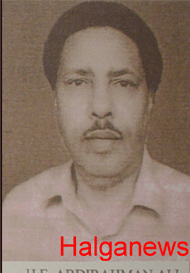
Tuur was born in 1931 in Burao, then a part of the British Somaliland protectorate. He hailed from the Isaaq clan.[2]
In a professional capacity, Tuur worked as a government official and diplomat in Somalia's post-independence government. He later became the Chairman of the Somali National Movement (SNM), a guerilla force mainly drawn from his Isaaq clan, which was attempting to topple former President of Somalia Siad Barre's military regime. Although the SNM at its inception had a unionist constitution, it eventually began to pursue a separatist agenda, looking to secede from the rest of Somalia. Under Tuur's leadership, the local administration declared the northwestern Somali territories independent on 18 May 1991. He then became the newly established Somaliland polity’s first President, but subsequently renounced the separatist platform in 1994. Tuur concurrently began instead to publicly seek and advocate reconciliation with the rest of Somalia under a power-sharing federal system of governance.[3] In doing so, he also represented the interests of many other Isaaq members, who were against secession; particularly those within his own sub-clan.[2] Tuur additionally lent some support to the UNOSOM peace-building mission in the southern regions. This alienated him from Somaliland's succeeding government as well as certain former followers.[4]
When support for Tuur in southern Somalia failed to materialise, he was exiled to London UK for almost a decade, before returning to Somaliland on 10 February 2003, 9 months before his death on 8 November 2003.

http://www.justice.gov/sites/default/fi ... _north.pdfVigorously opposed to secession by the north, the various Somali factions made statements at the conferences in Addis Ababa, Cairo and, most recently, Nairobi affirming the sanctity of Somali unity (Results n.d.; New African May 1994b, 8;The Christian Science Monitor 6 Jan. 1994). Political organizations such as the Somali Democratic Association (SDA) and the United Somali Party (USP), which represent the interests of the Gadabursi and the Darood (Warsengele and Dulbahante) respectively, are on record as being opposed to secession ( Leatherbee, Leah and Bricker Jan. 1994, 29). Further, in April 1994, the first head of state of the self-proclaimed republic, Abdirahman Ahmed Ali, currently president of the Somali National Movement, declared his opposition to secession during a press conference in the Ethiopian capital of Addis Ababa ( Reuters 30 Apr. 1994). He added that "the path followed by the Somali people in the north and south of the country to resolve the Somali crisis has not achieved the desired results" ( AP 29 Apr. 1994). The current president of Somaliland, Mohammed Egal, described Ahmed Ali as a traitor ( AFP 29 Apr. 1994); he had said that the people of the north did not want to [translation] "put their fate in the hands of a central power in Mogadishu" (Marchés tropicaux 28 Jan. 1994, 163). According to Reuters, "The north-west is still threatened by clan war between ethnic militias who want to keep their independence and others which want to rejoin the rest of Somalia" ( Reuters 10 Feb. 1994).
 in my opinion the guy has more common sense & Logic than any of these land rovers on this forum! Becuz he wanted to Unite with his fellow somali!
in my opinion the guy has more common sense & Logic than any of these land rovers on this forum! Becuz he wanted to Unite with his fellow somali!He never did used to do this victimhood waa waa siad barre boggie man nonsense ! He saw the wealth in a United somalia!
May Mr Tuur Rest in Peace! Hopefully a role model to every isaaq out there & every somali!





